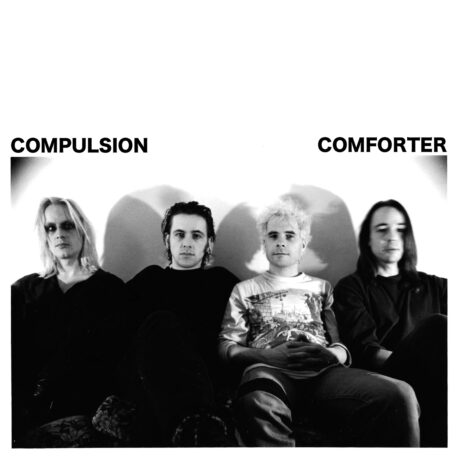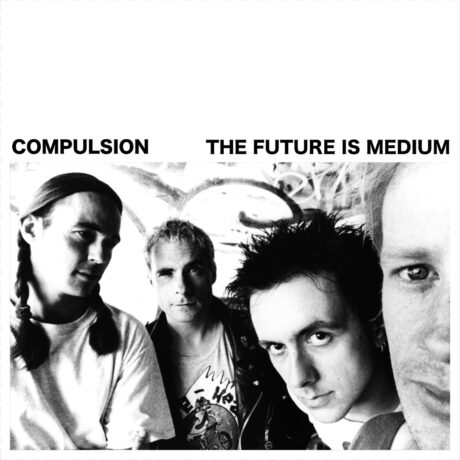Interview mit Compulsion (english version)
For me, Compulsion are one of the great bands of the 1990s. Even though Josephmary (voc.), Garret Lee (g.), Sid Rainey (b.) and Jan Alkema (dr.) have been denied great success, their songs still have an incredible dynamic that has allowed them to age well. As part of the re-release of their two albums „Comforter“ (1994) and „The Future Is Medium“ (1996), we spoke to Jan about the early days of Compulsion and the reasons why it makes sense to re-release the two albums.
CRAZEWIRE: Let’s start by going back 30 years. Can you remember what it was like when you released your debut album „Comforter“?
Jan Alkema: Before „Comforter“ we had released two EPs on our own label Fabulous Recorders: „Compulsion“ and „Casserole“. The tracks on those records were selected from a couple of recording sessions, leaving lots of songs for some or other future purpose.
Those EPs laid the ground work. We got some great reviews in the NME and Melody Maker, which meant we got to play more shows. Then, Rick Lennox (A&R at OLI records) saw us play at a festival and signed us. All those unreleased songs we had already recorded became the album „Comforter“.
CRAZEWIRE: With „Mall Monarchy“ and „Basketcase“ you released two rather unconventional singles in 1994. At least „Mall Monarchy“ was a small indie hit. What were your expectations as a band back then?
Jan: Things moved so quickly that our confidence grew, and we were quite certain that long before people would want to buy our records and come see us play live. We didn’t think success was inevitable or guaranteed, but it just seemed quite possible as long as we kept our shows exciting and continued developing and writing more music. To us it was abundantly clear that we had a rare chemistry between the four of us; music poured out of us, songs were piling up at a phenomenal rate, and few bands could match us for energy when it came to playing live.
Those two singles you mention were so different to what was out there, especially the subject matter: „Mall Monarchy“ is about the man who invented the concept of shopping malls, and, „Basketcase“ references the story of Moses to reflect on the reality of a modern day, single mother.

(c) One Little Independent / Charles Peterson
CRAZEWIRE: What many people have forgotten today is that MTV was pretty important back then. So was the music press in the UK. How did you perceive that back then?
Jan: Indeed MTV was essential for success back then, especially in the USA. So we were astonished to hear that MTV had banned our „Mall Monarchy“-video (apparently too violent for those days…go figure!). Our „Basketcase“-video also got a rough deal from MTV: it was scheduled to debut on the Beavis & Butthead Show, but rather than play just the video the screen went black , song muted, as Beavis and Butthead chatted to each other. Weird, no? MTV did do some other stuff with us, but for some reason they didn’t really talk to us, so the overall effect was kinda neutral I think. US College radios did like us and we did connect to an audience that way.
CRAZEWIRE: In Germany, the press was very favourable towards you and praised your live qualities in particular. Can you still remember the shows in Germany? I seem to remember an article that described in great detail how good you were as the support act of The Levellers.
Jan: Germany was really good fun to play for us. Shows were well attended, lots of lovely people who were genuinely please to see us. We also have a passion for bands like Neu!, Faust and Kraftwerk which greatly influenced our songwriting and artwork.
The tour we did with The Levellers was one of our favourite times on the road, it was a total blast from start to finish. Not sure about the live review you mention, but would love to read it (in English if at all possible please!)
We also did two tours opening for Die Toten Hosen, which was beyond intimidating. Imagine 20,000 people chanting „Hosen…Hosen….HOSEN!!!” as you’re trying to play your set! But their frontman Campino did do his best to have them be kind to us, as he was a huge fan of our music. He was a delight to be around, a genuinely great frontman who gave 100% every single night.
CRAZEWIRE: 1997, one year after the release of your second album „The Future Is Medium“, you disbanded. Why?
Jan: The end was quite a shock for us, especially as we had recently returned from our first tour in Japan. The four of us had been together since 1990, sharing everything, doing everything together. But, we didn’t have the support you need from music magazines and radio or tv-stations. This meant we didn’t sell enough records and eventually our label OLI decided to end our contract. The four of us had no option other than to go our separate ways. Utterly heartbreaking but unavoidable.

(c) One Little Independent / Charles Peterson
CRAZEWIRE: I still remember that your look on „The Future Is Medium“ irritated me just as much as most of the songs on the album. Today I think it has aged incredibly well. Why do you think that is?
Jan: Indeed „The Future is Medium“ wouldn’t sound out of place on today’s playlist. But then maybe that was the whole point when we created it. Garret described us back then as being: „a retro band from the future”. Our appearance (orange hair and identical outfit) was part and parcel of the statement that the future is medium; no matter how different people try to look, ultimately they will become part of a vast tribe. It’s impossible to be edgy or novel for very long, it all becomes ‘medium’ in the end.
CRAZEWIRE: 2023 Sid then started a group chat. How can the reader imagine that? Have you had loose contact over the years or did you have to get to know each other again?
Jan: There was never any animosity between us, but we had spent so much time working our arses off without genuine success that it broke us mentally. We had nothing left in the tank. After we split the main obstacle for staying in touch was one of location. Josephmary had moved back to Dublin, Sid stayed in London, Garret moved to Maidstone then to L.A., and I went to live in Brighton. We did see each other once in a while for a few years, which was always great fun, but ultimately distance just made it too difficult. Thank god Sid created that group chat, the years just fell away and we have a great time hanging out ‘virtually’ every now and then.
CRAZEWIRE: One Little Independent is now releasing your two albums on vinyl again. With 31 songs, „Comforter“ in particular has a great and extensive track list. How important was it for you to re-release so many tracks? And how does it feel that there is obviously still interest in the band and these records 30 years after its release?
Jan: It came as a huge surprise when OLI said they wanted to do an anniversary release. For some reason the label owner Derek Burkett has always had a soft spot for us, and supported us from day one. We feel beyond lucky to have this happen to us. It’s also fantastic to have Rick Lennox back on the ‘team’ just like the good old days; looking out for us, dealing with all the behind the scenes issues, making sure this re-release becomes a reality. The „Comforter“ re-release is a double vinyl so that it includes those early EPs as well as the original „Comforter“ track listing. They contain almost everything we had recorded on our own label before we signed to OLI. The vinyl re-release of „The Future is Medium“ has the original track listing. Basically, those three vinyls contain almost everything we ever recorded, but remastered to make sure it sounds as good as it gets.
CRAZEWIRE: As an old fan who unfortunately never got to see you live, I have to ask about further plans. Are there any live shows planned, or is the release more of a done deal?
Jan: Sorry, absolutely no chance of any live shows.
CRAZEWIRE: Thank you very much for your time and – allow me to make this personal comment – thank you for your music, which has been with me for 31 years now. All the best and best regards.
Jan: Thank you for these questions Lasse, I’ve enjoyed trying to answer them, dragged up lots of memories from 30 years back. It’s truly wonderful to hear that our music can still connect with new people across the decades.
Picture / Main Page: Charles Peterson
